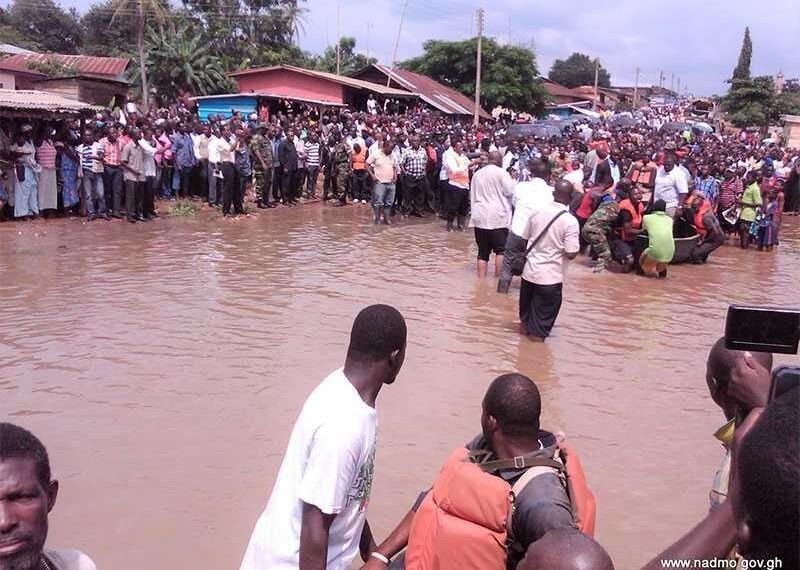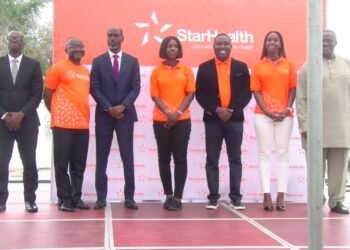The Ghana Ministry of Finance, the United Nations Development Programme (UNDP), the German Government, and the Insurance Development Forum (IDF), have announced the launch of a Tripartite project to develop a sovereign risk transfer scheme for urban floods in Ghana, alongside long-term investments in the country’s capacity to leverage and integrate insurance and risk financing into their development strategies.
The announcement was made during the IDF Summit in Zurich, Switzerland. The flood insurance aims to enhance the response of the Ghanaian National Disaster Management Organisation (NADMO) and local authorities after severe flooding, especially for poor and vulnerable people.
The risk transfer project is led by IDF members Allianz and Swiss Re, and closely supported by UNDP. Further partners in the project are flood risk consultants HKV, microsatellite operator ICEYE, and media monitor Flood Tags.
Alhassan Iddrisu, Director, Economic Strategy and Research Division at Ghana’s Ministry of Finance, hailed the Tripartite Insurance Programme.
“We welcome the cross-sector collaboration in the Tripartite Insurance Programme as one of the financing mechanisms for climate adaptation. Through the industry-led insurance project to develop an innovative risk transfer scheme for urban floods, with its knowledge-sharing element, we aim to improve and develop greater local ownership of risk analysis and provide a faster response and recovery, especially to our most vulnerable citizens.
“The work with UNDP will contribute to mainstreaming climate and disaster risk finance into our Ministry’s work, and together, these efforts will help to strengthen our country’s macroeconomic stability and sustainable development agenda.”
Alhassan Iddrisu
Pre-defined Trigger for Pay-out
By carefully selecting a pre-defined trigger for pay-out as opposed to assessing actual losses, the parametric insurance solution will enable quick pay-outs in case of a flood. This will improve resilience and support the rapid re-establishment of economic activity of low-income communities in urban areas, starting with the Greater Accra Metropolitan Area (GAMA). While developing an insurance scheme for major floods, the project also aims to enhance the disaster response capacity of Ghanaian institutions through increased access to data, detailed risk insights, and activation of contingency protocols.
Ababacar Diaw, CEO, Allianz Ghana, averred that the collaborative development of this parametric insurance solution through a public-private partnership plays into the UN Sustainable Development Goals.
“This partnership is an important contribution to increasing the climate resilience of urban poor and vulnerable people in Accra. Parametric insurance solutions are especially useful in regions where insurance infrastructure, such as good data, is less available.”
Ababacar Diaw
The UNDP-led work with the Government of Ghana aims to enhance the country’s long-term financial resilience, through strengthening capacity to financially manage risk, the integration of insurance and risk financing into national development strategy and delivery, and the development of insurance markets and inclusive insurance solutions for at-risk populations.
UNDP Resident Representative in Ghana, Angela Lusigi, pointed out saying, “At UNDP Ghana, we are committed to supporting integrated development solutions that build resilience across society to protect Ghana’s development progress.”
“This project to develop an innovative insurance solution for managing flood risks and to provide rapid pay-outs as a safety net for poor and vulnerable urban communities is welcome. It will serve as a boost to government and private sector efforts to provide wider access to insurance and risk finance.
“By blending the financial-solution expertise developed by the government, with the long-term development and governance support offered by UNDP in partnership with the private sector, we will be able to advance Ghana’s ambitious development agenda.”
Ababacar Diaw
Ghana is one of the countries most prone to floods in West Africa, and the impact of climate change is exacerbating the risk of flooding in urban areas. While the entire population of Greater Accra may indirectly benefit from the risk transfer product, the core beneficiaries are the poor and vulnerable residents in the Greater Accra Metropolitan Area (GAMA) region.
READ ALSO: Successive Governments Fail to Find Long-term Ways to Stabilize the Cedi- Finance Committee Member






















